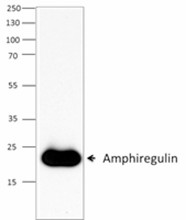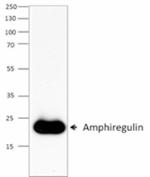- Clone
- 1501107 (See other available formats)
- Regulatory Status
- RUO
- Other Names
- Amphiregulin (AR), AREG, Schwannoma-derived growth factor (SDGF), Colorectum cell-derived growth factor (CRDGF)
- Isotype
- Rat IgG2a, κ
- Ave. Rating
- Submit a Review
- Product Citations
- publications

-

Western blot analysis of 50ng of Recombinant Mouse Amphiregulin (carrier-free) under non-reducing condition. Purified rat anti-mouse Amphiregulin antibody (clone 1501107) was used, followed by HRP Goat anti-rat IgG (minimal x-reactivity) antibody.
| Cat # | Size | Price | Quantity Check Availability | Save | ||
|---|---|---|---|---|---|---|
| 684802 | 100 µg | $288 | ||||
Amphiregulin was initially identified in the conditioned medium of human mammary gland MCF-7 cells treated with TPA. The mouse gene was cloned from the androgen-dependent SC2G cell line derived from Shionogi mouse mammary carcinoma SC115. It belongs to the EGF family of proteins that includes EGF, TGF-α, heparin-binding EGF like-growth factor (HB-EGF), epigen, epiregulin, and betacellulin. Mouse amphiregulin is derived from a 248 amino acid transmembrane precursor and it has 66% identity to the human protein. All the EGF family members are synthesized as type I membrane protein precursors, which can undergo proteolytic cleavage at the plasma membrane to release a mature soluble ectodomain. ADAM17 (TACE) has an important role in ectodomain shedding of amphiregulin, TNF-α, and HB-EGF. This cleavage is a key step in the control of ligand availability and receptor activation. It is stimulated by physiological and pharmacological agonists, including TPA, calcium ionophores, GPCR ligands, cytokines, and growth factors. Amphiregulin is a paracrine regulator of estrogen action during ductal morphogenesis (mammary gland development), and it has been associated with breast cancer initiation and progression. Amphiregulin is elevated in psoriatic lesional skin, gastrointestinal carcinomas, colorectal cancer, and hepatocelular carcinoma tissues. In addition, FOXP3+ Tregs express EGFR under inflammatory conditions, and amphiregulin enhances regulatory T cell-suppressive function in vitro and in vivo in a colitis and tumor vaccination model.
Product DetailsProduct Details
- Verified Reactivity
- Mouse
- Antibody Type
- Monoclonal
- Host Species
- Rat
- Immunogen
- Purified mouse Amphiregulin, amino acids (Ser94-Lys191) (Accession# NM_009704) expressed in E. coli.
- Formulation
- Phosphate-buffered solution, pH 7.2, containing 0.09% sodium azide
- Preparation
- The antibody was purified by affinity chromatography.
- Concentration
- 0.5 mg/ml
- Storage & Handling
- The antibody solution should be stored undiluted between 2°C and 8°C.
- Application
-
WB - Quality tested
- Recommended Usage
-
Each lot of this antibody is quality control tested by Western blotting. For Western blotting, the suggested use of this reagent is 0.5 - 2.5 µg per ml. It is recommended that the reagent be titrated for optimal performance for each application.
- Application Notes
-
This antibody works for Western blotting under non-reducing conditions.
- RRID
-
AB_2572176 (BioLegend Cat. No. 684802)
Antigen Details
- Structure
- 248 amino acids with a predicted molecular weight of approximately 27 kD.
- Distribution
-
Fibroblasts, epithelial cells, carcinoma cell lines, T cell subsets, naive and memory CD4 and CD8 T cells, Th1 and Th2 cells, mast cells, eosinophils, and basophils.
- Function
- Amphiregulin induces proliferation of fibroblasts, keratinocytes, and normal and malignant epithelial cells. It acts in normal development, organogenesis, and tumorigenesis. Ampiregulin release is mediated by IL-1β in fibroblast-like synoviocytes in rheumatoid arthritis patients. It is induced by IL-3 and IL-5 in basophils and eosinophils, respectively.
- Interaction
- Keratinocytes, epithelial cells, fibroblasts, carcinoma cells, and FOXP3 Tregs.
- Ligand/Receptor
- EGFR (HER1).
- Cell Type
- Basophils, Eosinophils, Epithelial cells, Fibroblasts, Mast cells, T cells, Th1, Th2, Tregs
- Biology Area
- Cancer Biomarkers, Cell Biology, Cell Cycle/DNA Replication, Cell Proliferation and Viability, Immunology, Signal Transduction
- Antigen References
-
1. Plowman GD, et al. 1990. Mol. Cell Biol. 10:1969.
2. Sonoda H, et al. 1992. Biochem. Biophys. Res. Commun. 185:103.
3. Le Gall SM, et al. 2003. J. Biol. Chem. 278:45255.
4. Berasain C, et al. 2007. Cancer Letters 254:30.
5. Busser B, et al. 2011. Biochem. Biophys. Acta. 2:119.
6. Latasa MU, et al. 2012. PLoS One 7:e52711.
7. Qi Y, et al. 2012. PLoS One 7:e39072.
8. Zaiss DM, et al. 2013. Immunity 38:275.
9. Taira N, et al. 2014. Proc. Natl. Acad. Sci. USA 111:717. - Gene ID
- 11839 View all products for this Gene ID
- UniProt
- View information about Amphiregulin on UniProt.org
Related Pages & Pathways
Pages
Related FAQs
Other Formats
View All Amphiregulin Reagents Request Custom Conjugation| Description | Clone | Applications |
|---|---|---|
| Purified anti-Amphiregulin | 1501107 | WB |
Compare Data Across All Formats
This data display is provided for general comparisons between formats.
Your actual data may vary due to variations in samples, target cells, instruments and their settings, staining conditions, and other factors.
If you need assistance with selecting the best format contact our expert technical support team.
-
Purified anti-Amphiregulin

Western blot analysis of 50ng of Recombinant Mouse Amphiregu...
 Login/Register
Login/Register 







Follow Us